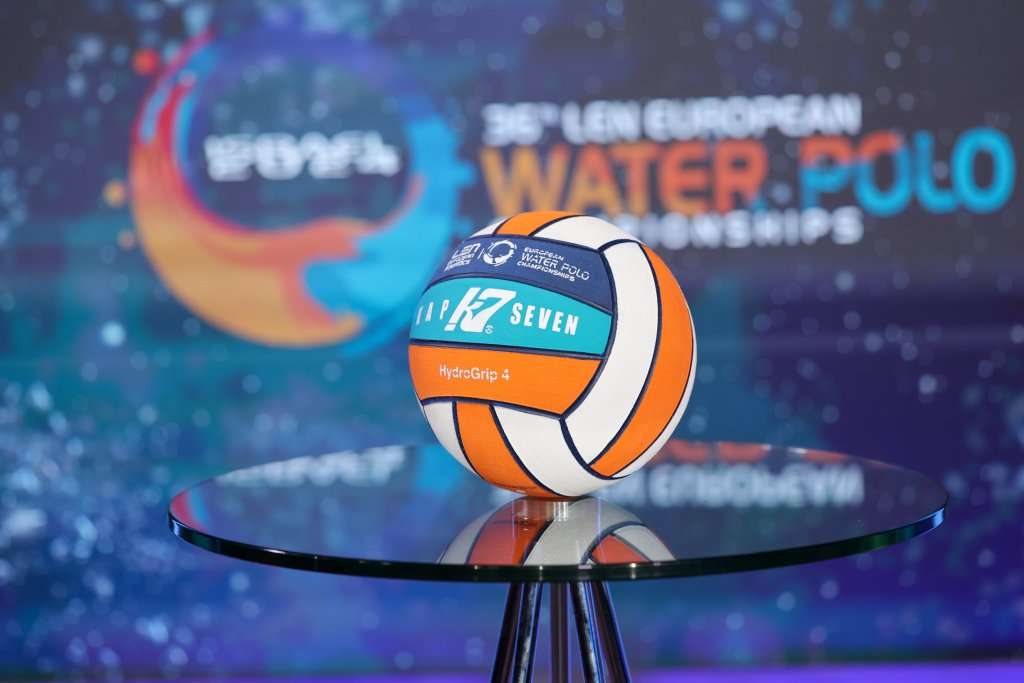Courtesy: LEN
With the introduction of the two-division format for the upcoming edition, the draw for the European Water Polo Championships Israel 2024 was even more exciting than ever before. With respective Olympic berths at stake in both the men’s and women’s tournaments, an outstanding excitement is guaranteed right from the beginning.
Televised and streamed live, the draw for the 2024 European Water Polo Championships took place in Netanya, the site of the event next January. The draw was conducted by LEN TWPC Chair Angel Moliner, who was assisted by players from the Israeli men’s and women’s national teams; Ido Goldschmidt, Yahav Fire, Ayelet Peres and Maria Mia Bogachenco.
The championships will add a new chapter to the 98-year-old history of the event as it’s going to be the first edition with 32 teams (16 in both genders) and the debut of the two-division format, where the fields are divided into a first and a second division based on the ranks achieved last September at the previous championships and the qualifications held in June. The format, already in use at the age-group majors, will offer many more thrilling matches at the group stage without taking away the chance from any team to make it to the top.
The draw for the women’s tournament set up the very same groups we saw in Split (as far as the top four ranked sides considered from 2023, when there were groups of six). World champion Netherlands, European runner-up Greece, and 2022 world silver medallist Hungary will fight for the top two spots, which guarantee a direct quarter-final berth, while the third and fourth-placed teams need to face the challengers from the second division in crossover matches to book a spot in the quarters. Croatia completes the field in this group, while the other will see the clash of title-holder Spain and European and world bronze medallist Italy, alongside host Israel and France.
The men’s tournament shall also offer thrills right from the beginning – on Day 1, Hungary and Greece shall replay the World Championship final as a kick-start of the tourney. These two will then face tough encounters against 2022 world silver medallist Italy, and Georgia will look for an upset or two on game days.
In the other group, title-holder Croatia is to meet Spain, bronze medallist at the Worlds this July (and winner last year), and the Croats can also go for revenge against Montenegro, which ousted them in the crossovers in Fukuoka. France will surely try its best before the home Games in the summer – and one should not forget that finishing fourth in this group will most probably mean a crossover match against Serbia, which should finish at the top in Group C in the second division. The Serbs left the daunting memories of their Split crash behind by reaching the semis at the Worlds, so they will be a tough rival for any sides playing in the first division.
Stakes are high as both champions shall secure an Olympic berth, or, if any of the already qualified teams win gold (Hungary or Greece among the men, Netherlands or Spain among the women), the next highest-ranked side would celebrate the qualification to Paris 2024.
The European Championships are set to begin on January 3rd, with the medal rounds scheduled for January 15th for the women and January 16th for the men.
𝗬𝗼𝘂𝗿 𝗡𝗲𝘁𝗮𝗻𝘆𝗮 𝟮𝟬𝟮𝟰 𝗺𝗲𝗻‘𝘀 𝗴𝗿𝗼𝘂𝗽𝘀 𝗮𝗿𝗲 𝗹𝗼𝗰𝗸𝗲𝗱 𝗶𝗻
Who will progress into the European #WaterPolo Championships Israel 2024 knockout stage?
#WPNetanya2024 | #vaterpolo #vizilabda #pallanuoto pic.twitter.com/QuIsfKfiGr
— LEN – European Aquatics (@LENaquatics) September 12, 2023
MEN
Division I
Group A
- Montenegro, Spain, France, Croatia
Group B
- Georgia, Hungary, Italy, Greece
Division II
Group C
- Serbia, Germany, Israel, Malta
Group D
- Slovakia, Netherlands, Slovenia, Romania
𝗪𝗢𝗠𝗘𝗡‘𝗦 𝗚𝗥𝗢𝗨𝗣𝗦 𝗖𝗢𝗡𝗙𝗜𝗥𝗠𝗘𝗗
Some big match-ups are heading your way at the European #WaterPolo Championships Israel 2024, 3-16 January
#WPNetanya2024 | #vaterpolo #vizilabda #pallanuoto pic.twitter.com/6jYzUuGBjQ
— LEN – European Aquatics (@LENaquatics) September 12, 2023
WOMEN
Division I
- Netherlands, Hungary, Croatia, Greece
Group B
- Spain, Israel, France, Italy
Division II
Group C
- Romania, Serbia, Chechia, Turkiye
Group D
- Slovakia, Germany, Great Britain, Bulgaria


